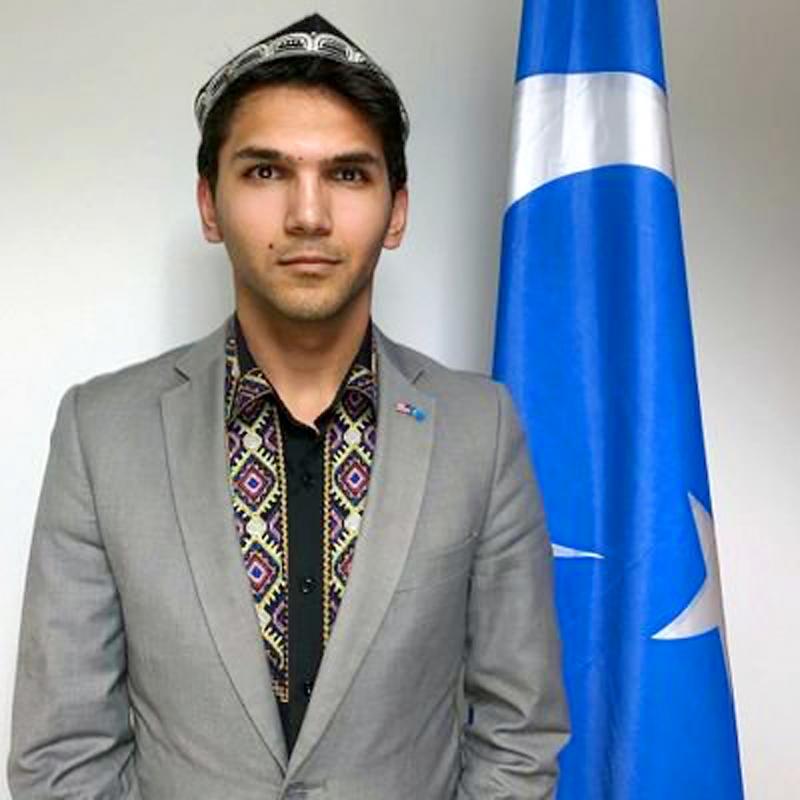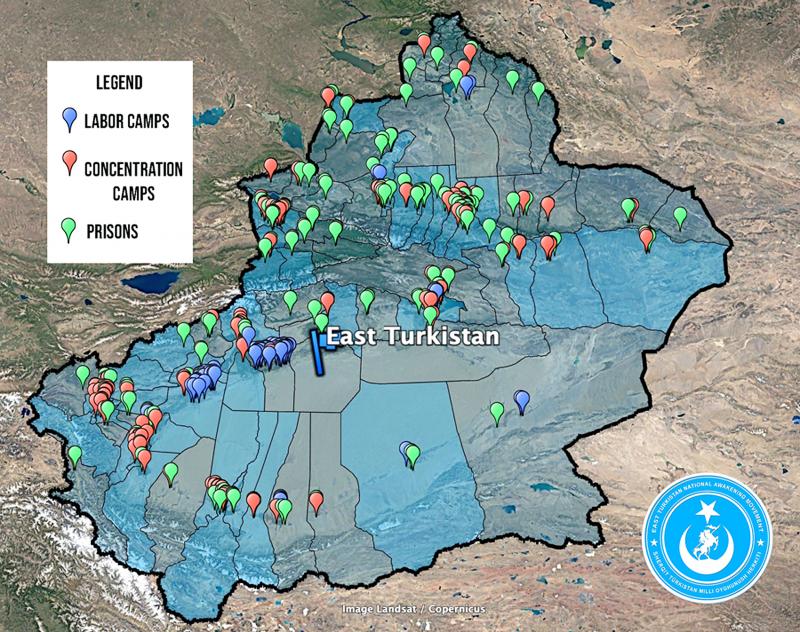When Salih Hudayar was born in the small city of Artux, East Turkestan, in May, 1993, the land of his birth had been under Chinese control for 44 years.
A Uighur by birth, Hudayar was just seven years old when he and his family moved to the US in 2000, arriving as political refugees before settling in Oklahoma, where he went to school and eventually joined the US Reserve Officer Training Corps.
Always aware of his background and family heritage, however, in 2017 Hudayar established the East Turkestan National Awakening Movement, and within 12 months was meeting members of the US Congress to promote awareness of China’s oppression of Uighur people.

Photo courtesy of Salih Hudayar
GENOCIDE IN XINJIANG
His reference to a “genocide” being carried out against his people in 2018 is now a commonly accepted term for China’s treatment of millions of predominantly Muslim Uighurs and other Turkic peoples across East Turkestan — an area Beijing refers to as Xinjiang.
In late 2019, as an increasingly prominent figure in the push for East Turkestan independence, Hudayar was elected prime minister of his nation’s government-in-exile, and early last year, the term “genocide” was echoed by former US secretary of state — and recent visitor to Taiwan — Mike Pompeo, who said “I have determined that the People’s Republic of China (PRC), under the direction and control of the Chinese Communist Party (CCP), has committed genocide against the predominantly Muslim Uighurs and other ethnic and religious minority groups in Xinjiang.”

Photo courtesy of Salih Hudayar
He added that the world is “witnessing the systematic attempt to destroy Uighurs by the Chinese party-state.”
A few days ago Prime Minister Hudayar, one of the world’s best known faces of the Uighur cause, spoke with the Taipei Times.
Hudayar last year said that world leaders have largely ignored the genocide in East Turkestan, choosing profits over humanity. Have conditions improved? “Not much has changed,” he says.

Photo courtesy of Salih Hudayar
“The Trump Administration formally recognized China’s atrocities as genocide and this has carried on into the Biden Administration with nations in Europe including the UK, the Netherlands, Lithuania, Czech Republic, Belgium and France formally recognizing the same. However, not much has been done beyond that,” Hudayar says.
In recent weeks Russian aggression against Ukraine has taken attention away from the Chinese genocide against the Uighurs.
The US and Western governments, he says, are “almost belittling themselves, begging China to step in and apply pressure on Russia.”
Chinese leader Xi Jinping (習近平) on March 18 told US President Joe Biden that the US must oppose Taiwan independence and not interfere in issues such as Tibet and Xinjiang.
This “has had a negative impact on our struggle because the international community no longer seems to be willing to apply pressure on China” because of the conflict in Ukraine, Hudayar says.
But, he adds, this isn’t about race or religion, a common claim made by the international media. Instead, “the free world being more impacted by the actions Russia will take in Ukraine” due to geographical location, “whereas in East Turkestan, Taiwan and Tibet, we’re thousands of miles away from Europe or the US.”
DOUBLE STANDARD
The world has “completely or largely forgotten, given the fact that it is now eight years since China initiated its campaign of genocide and mass internment in East Turkestan, yet you don’t see governments doing anything significant to punish China, or to uphold their obligations under the UN Genocide Convention, whereas with the Russian invasion of Ukraine you see this double standard,” Hudayar says.
“Immediately you have Western governments applying sanctions, hundreds of western companies leaving Russia and governments urging the International Criminal Court (ICC) and International Court of Justice (ICJ) to investigate Russia” although no such moves have been made to support the people of East Turkestan, who launched their own ICC case in mid-2020,” he adds.
No government has formally stepped up to urge the ICC to investigate Chinese officials for genocide, he says, adding that the international community in this regard are “remaining silent.”
Hudayar also commented on Taiwan’s approach to the Uighur and Turkic peoples’ cause, with Taipei increasingly vocal in its condemnation of the Russian invasion in recent weeks, despite being largely silent on the genocide in East Turkestan.
“There have been people in the ruling Democratic Progressive Party (DPP) and other party members who have spoken out against China’s genocide,” but on an official level the government has been relatively quiet, Hudayar says.
He also noted the large number of Chinese Nationalist Party (KMT) supporters in Taiwan who still officially view East Turkestan, Tibet and Mongolia as part of China.
“We fully support Taiwanese independence and we support the people of Taiwan,” he says. “We believe that [Taiwan is] already an independent and free nation. This is something they need to formally step up, and declare, whether there are protests from China or not.”
“However, we have the same common enemy,” he adds. “It’s crucial that we work together in as many ways as we can to cooperate and give each other mutual recognition and support in any way so we can to stand up against the PRC and the threat of the CCP.”

April 14 to April 20 In March 1947, Sising Katadrepan urged the government to drop the “high mountain people” (高山族) designation for Indigenous Taiwanese and refer to them as “Taiwan people” (台灣族). He considered the term derogatory, arguing that it made them sound like animals. The Taiwan Provincial Government agreed to stop using the term, stating that Indigenous Taiwanese suffered all sorts of discrimination and oppression under the Japanese and were forced to live in the mountains as outsiders to society. Now, under the new regime, they would be seen as equals, thus they should be henceforth

Last week, the the National Immigration Agency (NIA) told the legislature that more than 10,000 naturalized Taiwanese citizens from the People’s Republic of China (PRC) risked having their citizenship revoked if they failed to provide proof that they had renounced their Chinese household registration within the next three months. Renunciation is required under the Act Governing Relations Between the People of the Taiwan Area and the Mainland Area (臺灣地區與大陸地區人民關係條例), as amended in 2004, though it was only a legal requirement after 2000. Prior to that, it had been only an administrative requirement since the Nationality Act (國籍法) was established in

Three big changes have transformed the landscape of Taiwan’s local patronage factions: Increasing Democratic Progressive Party (DPP) involvement, rising new factions and the Chinese Nationalist Party’s (KMT) significantly weakened control. GREEN FACTIONS It is said that “south of the Zhuoshui River (濁水溪), there is no blue-green divide,” meaning that from Yunlin County south there is no difference between KMT and DPP politicians. This is not always true, but there is more than a grain of truth to it. Traditionally, DPP factions are viewed as national entities, with their primary function to secure plum positions in the party and government. This is not unusual

US President Donald Trump’s bid to take back control of the Panama Canal has put his counterpart Jose Raul Mulino in a difficult position and revived fears in the Central American country that US military bases will return. After Trump vowed to reclaim the interoceanic waterway from Chinese influence, US Defense Secretary Pete Hegseth signed an agreement with the Mulino administration last week for the US to deploy troops in areas adjacent to the canal. For more than two decades, after handing over control of the strategically vital waterway to Panama in 1999 and dismantling the bases that protected it, Washington has